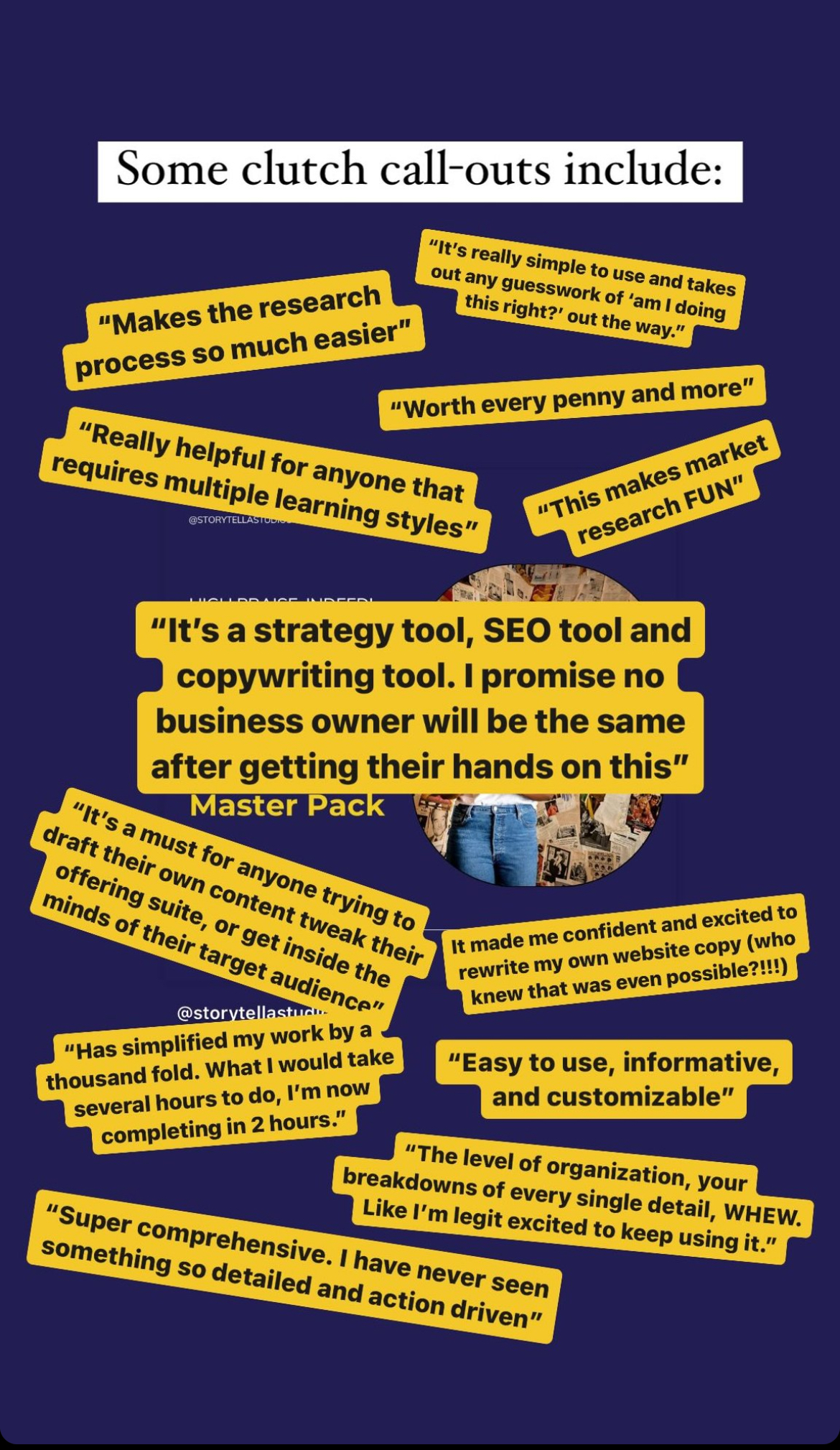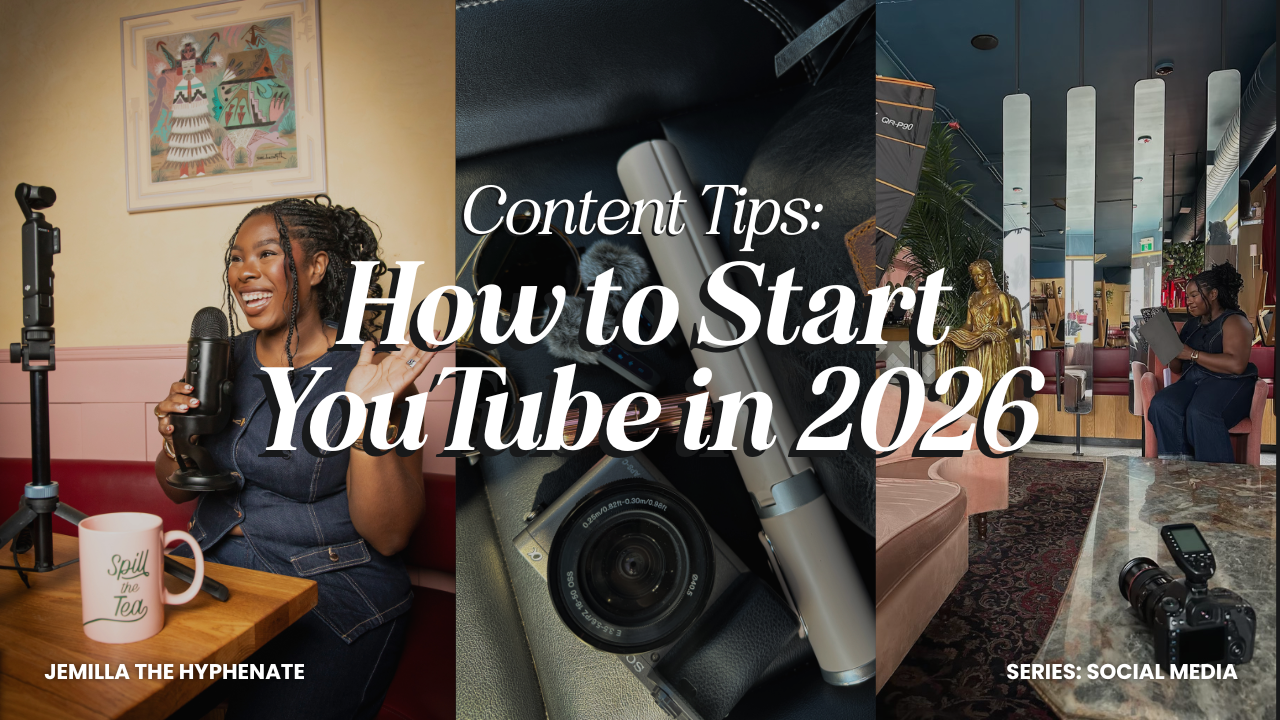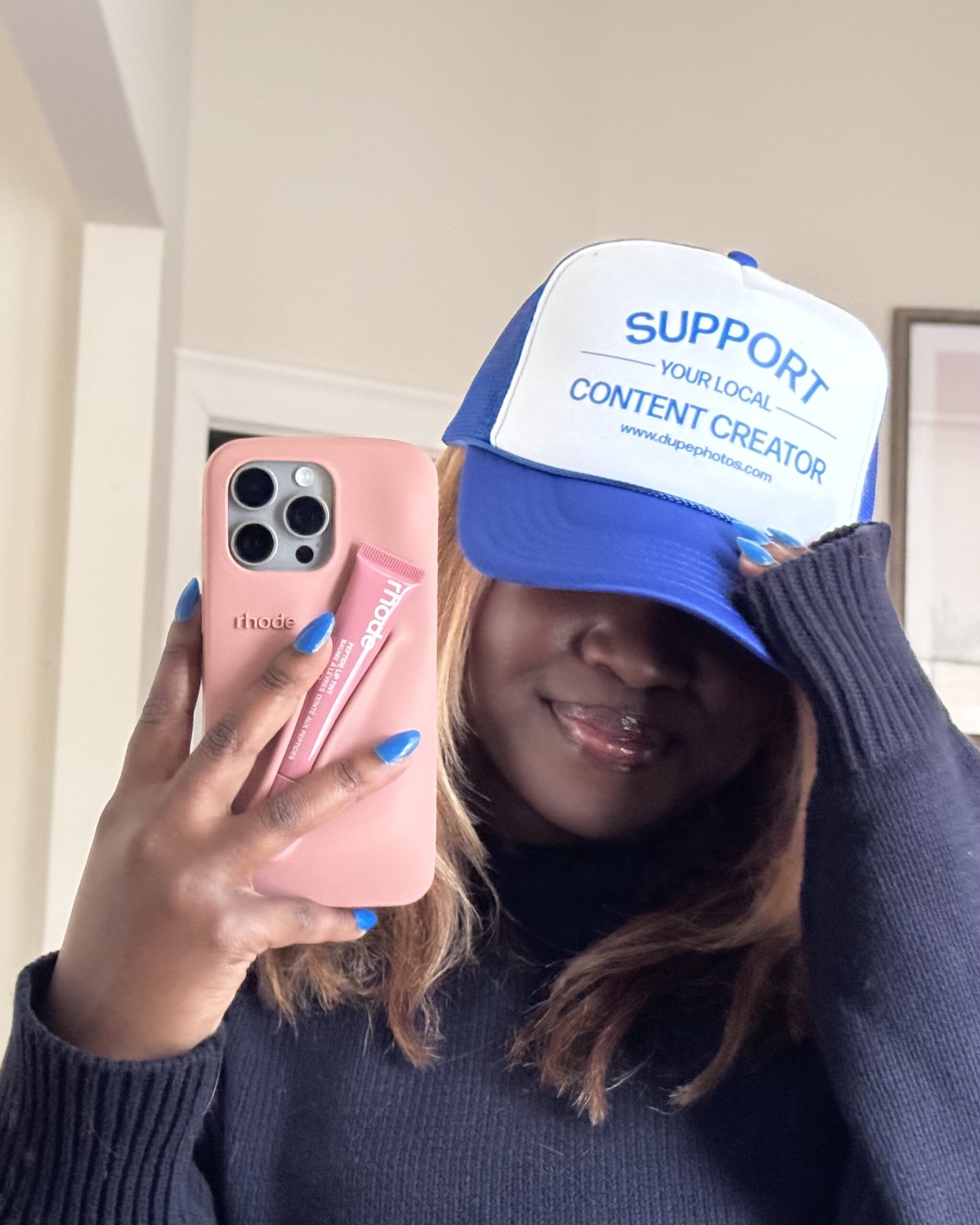HEY FRIEND!
I'm jemilla!
In the past 4 years, I’ve cut my teeth strategizing & writing award-worthy, revenue-increasing, results-snatching copy. And what really lights my fire is writing for woman-owned and BIPOC-led brands. I’m talkin’ the first day after a braiding appointment type of excited! Energizing them to go big with their bold ideas so that when launch time happens, the world thinks “OMG FINALLY, I’ve been waiting for something like this.” And giving them the tools to diversify the market.
about me
services
13 Market Research Tools & Techniques for Online Businesses
August 6, 2024
Too long, don’t wanna read? Listen in less than 10 minutes ⬇️
If you’re a small business owner that operates online, you need to do market research for a number of reasons:
- Find content ideas
- Learn more about your target audience
- Explore the market
- Discover your strengths, weaknesses, and opportunities
And there are a lot of tools out there — too many to sort through. But after 4 years of writing copy for dozens of brands, I’ve compiled a list of reliable market research tools, and I want to tell you all about them.
Here’s what this post will dive into:
- What is market research
- Why small businesses need to do market research
- 3 brands that needed market research
- When do you need to do market research?
- 7 kinds of market research
- 13 market research tools
What is market research?
Market research is the process of collecting vital information about a company’s target audience, market, and competition. Through market research, you can understand your target audience better. You can make better products, improve user experience, and design a marketing strategy that attracts quality leads. (Emeritus)
Why small businesses need to do market research
1) It helps you put customers first
Research insight reveals what your customer wants and needs, as well as what will actually work in the market. So you create products and services that work for them, not just what you *think * will work for them.
2) It makes you look better
When you make products, services, and the buying experience with your target audience in mind, they appreciate you more! You’ll look more intentional and caring than any other brand that just sells stuff for the sake of it.
3) Market research can help you find answers
If you’re wondering what product or service to make, how to sell it, and who to sell it to, market research can help you find out. Plus, you’ll discover emerging market trends, competitor strategies, and evolving customer must-haves to keep you ahead of the curve!
What happens if you skip the market research process?
There have been countless recorded fumbles when big name brands skip the market research process (but you’re a busy person, so I’ll just share three examples).
1) Target’s failed launch in Canada
They spent millions on marketing and banked on name recognition alone to carry them in the Canadian market, not bothering to really get to know Canadian consumers or research the Canadian supply chain enough.
It took them less than 2 years to close all their stores in Canada and call the launch a failure. Imagine if they’d done their research first 👀.
2) Blockbuster vs. Netflix
If the retro video store had done consistent market research, they may have found a new market opportunity: convenient home delivery rentals and online streaming.
Unfortunately, they filed for bankruptcy in 2010 while Netflix shot ahead.
(which sucks because I really loved going to Blockbuster. It was like a Friday night activity — browsing the shelves of rentals, picking out my choice of candy and popcorn shaker seasoning)
3) The short success of Clubhouse at the start of the COVID-19 pandemic
The audio-based, invite-only social media platform saw a huge drop in user engagement because we didn’t want or need an app like this, and social media giants like TikTok, Twitter, and Instagram already had haYOOGE market share and pulled their attention away.
I’m sure they saw a hole in the market… but did it really need to be filled? The huge drop-off at the app’s beta phase surely answered that question.
When do you need to do market research?
According to Emeritus, you need to do market research when you have a problem or need information. It goes like this:
First: Define the problem/goal
Then: Develop a market research plan
After that: Collect the data
From there: Analyze the data
You can: Present the data (OPTIONAL)
Finally: Take action
7 types of market research
Depending on the information you’re trying to find, and where you look, there are 7 types of market research that may be useful to you.
1) Primary Research
This is the information you find by going out and doing the research yourself. Think focus groups, Interviews, observation-based research, buyer persona research, and market segmentation research.
2) Secondary Research
This is any previously collected, analyzed, and published data from places like company websites, reports with industry statistics, white papers, and government agency data.
3) Quantitative Research
No, not girl math. This is any numerical data like polls, surveys, desk research, web statistics, and financial records.
4) Qualitative Research
Non-numerical, hard to measure information that tries to add more value and depth to the data — basically, humanizing it.
5) Research & Development (R&D) Research
This is any information that helps you improve your offers so you can meet the needs of your audience (UX design, packaging design & testing, features and upgrades, launch improvements, support improvements, etc.)
6) Advertising & Marketing Research
This research can help you find out what advertising channels to use, the strongest messaging to repeat, and reveal insights that help you create better campaigns!
7) Pricing Research
This kind of research helps you figure out how much people will pay for a product or service. You might find out what competitors charge for similar offers, the best parts of your offers that you can charge a premium for, etc.
13 Market Research Tools
Here’s the laundry list of market research tools:
- Answer the Public
- Ubersuggest
- Google Trends
- Think with Google
- Social Media
- Statista
- Semrush
- The Pew Research Centre
- The Consumer Research Questions Masterlist
- Typeform
- Google Forms
- The Market Research Master Pack
1) Google
In my opinion, this is the top tier free market research platform. Google is best for:
- Finding secondary research
- Confirming your hypothesis
- Learning more about the market, industry, and opportunities
2) Answer the Public
Another free tool, AnswerthePublic is great because it shows you the questions people are asking on search engines, prepositions (a.k.a. a word/group of words used before a noun, pronoun, or noun phrase to show direction, time, place, location, spatial relationships, or to introduce an object), what they’re comparing a certain thing to, and related search terms! Digital marketing guru Neil Patel acquired it in 2023 because “many large companies use AnswerThePublic, so by buying the software, those leads would bring me way more revenue than just the software alone. And I’ll easily make back the $8.6 Million I spent on it”.
But lest we forget his original baby ⬇️
3) Ubersuggest
Ubersuggest, like AnswerthePublic, is another free tool that’s great for content marketing and basic SEO keyword research. You get 3 free searches per day without investing in their paid plan — but as someone who invested in this tool before, I can say it was worth the money.
4) Google Trends
Google Trends is a great free tool for discovering interest in a topic, where those interested people live, and related topics and queries. Using what you find, the opportunities are endless. You can use the insight to help you with content creation, getting brand deals and/or funding, testing the viability of an offer, etc.
5) Think With Google
Think with Google is great for discovering consumer trends, marketing strategies, the future of marketing, and different tools, and it’s completely free!
6) Social Media
I love social media for discovering trending searches, what people are saying on competitor pages, and opportunities for offers! I especially love the creator search insights tool on TikTok — it’s helped me find ideas to create spec copy projects for trending topics/brands many a time.
7) Statista
Statista is THE GOAT for finding statistics — numbers are proven to catch more eyes than sweet storytelling, so you’ll definitely want to use this website to find some dope data. They hide most of their information behind a paywall, but you can find a lot of juicy statistics in the summary of most of their reports!
8) Semrush
Semrush is a PHENOMENAL, all-in-one tool for doing the most in-depth market research, consumer research, competitor research, content resaerch, and SEO research. If you didn’t want to use a bunch of tools and just use one, this is THE ONE to use. I’m not gonna lie… she’s expensive 🥲 But, like an all-inclusive resort, she’s worth the investment.
9) The Pew Research Centre
If you want to keep your finger on the pulse of society and culture, this free tool is best for that, and finding statistics about what different groups of people think about something.
10) The Consumer Research Questions Masterlist
This is a Storytella Studios® original freebie that has 92 consumer research questions you can swipe the next time you want to send out a survey or conduct an intimate interview. These questions will help you better understand your target audience and their buying behaviour, brand & product perception, and content consumption habits. You can download it for free here!
11) Typeform
This free online form builder has user-friendly and easy to customize templates for quizzes, research, feedback, lead generation, and more. I have the paid subscription so I have no limit to how many surveys I send out (because I use my account to do research for my clients), and with the paywall lifted I enjoy so many benefits!
12) Google Forms
The OG free form builder is also great for getting research, feedback, and generating leads — and, if you use Google Suite, you can easily integrate it with other docs and assets in your workspace!
13) The Market Research Master Pack™
If you’re a copywriter, marketer, or strategist of any kind, this will make your eyes bug out and turn into hearts like Sailor Moon. This Storytella Studios® digital product is a Notion-based research that has all the templates and tutorials you need to conduct, organize, analyze, and act on market research for your brand AND your client’s brands.
The master pack comes complete with:
- 10 prompts and scratchpad space to help you define your problem
- Scratchpad space to develop your market research plan
- Bite-sized walkthrough videos for 12 different market research tools (each video us under 15 min. long)
- 10 search prompts to plug into every platforms search bar
- A mastersheet template available on Google Sheets and Microsoft Excel, that has 10 tabs to organize and analyze the data
- 4 Canva templates for presenting the data internally, externally, and to the community
- Audio files for all the voice message-lovers, so you can listen to the entire mini-course
Over a dozen service providers are saying the Market Research Master Pack™ is:

Grab the research resource, and go from confusion to clarity!






